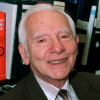Joseph Rotblat

Joseph Rotblat
Sir JosephRotblat KCMG CBE FRSwas a Polish physicist, a self-described "Pole with a British passport". Rotblat was the only physicist to leave the Manhattan Projecton the grounds of conscience. Rotblat's work on nuclear fallout was a major contribution toward the ratification of the 1963 Partial Nuclear Test Ban Treaty. A signatory of the Russell–Einstein Manifesto, he was secretary-general of the Pugwash Conferences on Science and World Affairs from their founding until 1973. He shared, with the Pugwash Conferences, the 1995...
NationalityPolish
ProfessionPhysicist
Date of Birth4 November 1908
CountryPoland
Then, we were told that a world war was prevented by the existence of nuclear weapons. Now, we are told that nuclear weapons prevent all kinds of war.
Several studies, and a number of public statements by senior military and political personalities, testify that - except for disputes between the present nuclear states - all military conflicts, as well as threats to peace, can be dealt with using conventional weapons.
Indeed, the very first resolution of the General Assembly of the United Nations - adopted unanimously - called for the elimination of nuclear weapons.
If the militarily most powerful - and least threatened - states need nuclear weapons for their security, how can one deny such security to countries that are truly insecure? The present nuclear policy is a recipe for proliferation. It is a policy for disaster.
But there are other areas of scientific research that may directly or indirectly lead to harm to society. This calls for constant vigilance.
As for the assertion that nuclear weapons prevent wars, how many more wars are needed to refute this arguments? Tens of millions have died in the many wars that have taken place since 1945.
The time has come to formulate guidelines for the ethical conduct of scientist, perhaps in the form of a voluntary Hippocratic Oath.
Since the end of the Cold War two main nuclear powers have begun to make big reductions in their nuclear arsenals. Each of them is dismantling about 2,000 nuclear warheads a year.
At this momentous event in my life - the acceptance of the Nobel Peace Prize - I want to speak as a scientist, but also as a human being.
This means that the only function of nuclear weapons, while they exist, is to deter a nuclear attack.
It was at this time, ... that Groves mentioned that the real purpose in making the bomb was to subdue the Soviets. I was terribly shocked.
At a time when science plays such a powerful role in the life of society, when the destiny of the whole of mankind may hinge on the results of scientific research, it is incumbent on all scientists to be fully conscious of that role, and conduct themselves accordingly.
My short-term vision is the abolition of nuclear weapons. My long-term vision is the abolition of war.
From my earliest days I had a passion for science.